
Indicator scoreboard
EMU - May harmonized index of consumer prices jumped 0.6 percent and 3.4 percent when compared with last year. Core inflation - excluding energy, food, alcohol and tobacco - rose from an annual rate of 1.9 percent in April to 2.1 percent in May, pushing above the ECB inflation limit of 2 percent for the first time. As in previous months, the increase in HICP was caused mainly by a rise in energy prices, up 2.0 percent, and food prices, up 1.2 percent on the month. The higher energy prices were also reflected in the 1.2 percent rise in transportation costs.
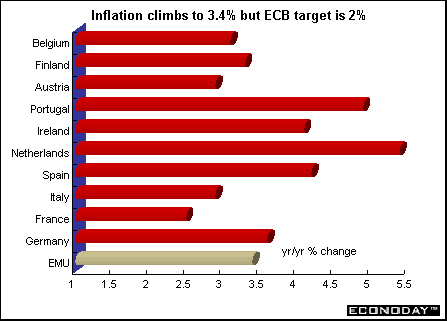
April industrial output declined 0.5 percent but rose 1.6 percent when compared with last year. March data were revised downward. Output fell in most sectors on the month, lead by a 0.6 percent drop in intermediate goods, followed by durable consumer goods (down 0.5 percent) and capital goods (down 0.1 percent). Non-durable consumer goods rose 0.3 percent. When compared with a year earlier, capital goods rose 3.5 percent, non-durable consumer goods rose 1.7 percent, and intermediate goods rose 1.0 percent. However, durable goods fell 1.6 percent.
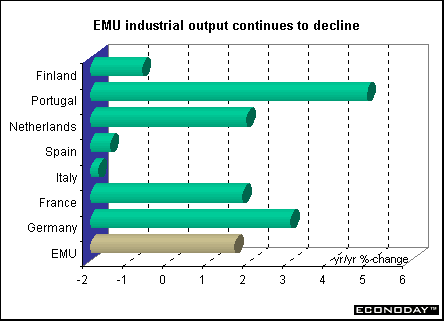
April first estimate of merchandise trade balance with the rest of the world was an E3.0 billion deficit, compared with a surplus of E200 million a year earlier. For the first four months of 2001, the EMU trade balance was in deficit by E5.6 billion, three times the deficit of E1.8 billion posted in the same period a year earlier.
Germany - April manufacturing orders were revised down sharply to a decline of 1.9 percent from the original decline of 1.1 percent. West German orders were revised down to a drop of 2.5 percent from the original 1.6 percent drop. East German orders were revised down to an increase of 4.1 percent from the original jump of 4.4 percent. Foreign orders were revised down to a drop of 1.9 percent on the month from a decline of 0.8 percent while domestic orders were revised down to a decline of 2.2 percent from a 1.5 percent decline.
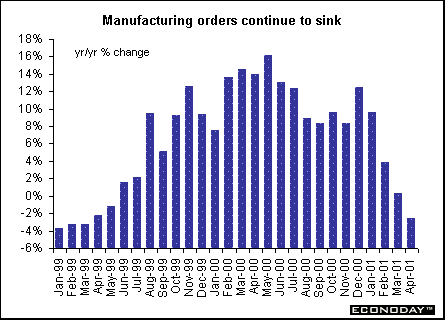
The May Ifo Institute west German business sentiment index dropped to 90.9, its lowest level since May 1999. It was the 11th drop in the last 12 months. Both business expectations and current conditions declined. The current conditions index is now at its lowest level since November 1999, while the expectations index is at its lowest level since February 1999.
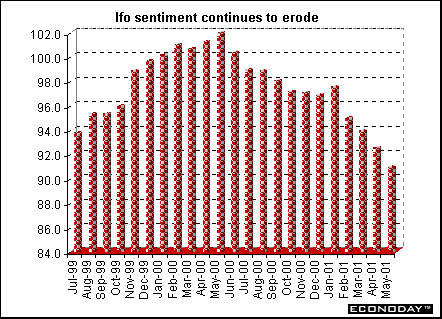
France - May seasonally and workday adjusted consumer spending on manufactured goods declined 0.5 percent but was up 1.9 percent when compared with last year. Excluding autos, parts and pharmaceuticals, spending on manufacturing goods was down 0.5 percent.
Italy - April industrial orders fell 7.9 percent when compared with last year after a 5.4 percent decline in March. Domestic orders fell 6.3 percent while foreign orders sank 10.2 percent. Domestic orders account for around 62 percent of the overall index, with foreign orders making up some 37 percent. Five out of ten product sectors declined with the steepest drops in the transportation sector (down 30.2 percent) and the chemical sector (down 13.7 percent). The recently introduced seasonally adjusted month-on-month orders data, which is still not closely followed by most analysts, showed April's orders fell 7.5 percent. Domestic orders shed 10.4 percent on the month, while orders from abroad were down 3.0 percent.
Final seasonally adjusted first quarter gross domestic product was revised to an increase of 0.8 percent and 2.4 percent when compared with last year. First quarter growth was led by inventories. Private consumption was unchanged on the quarter but up 1.7 percent on the year. Government consumption edged up 0.1 percent and rose 0.9 percent on the year; capital investment rose 0.6 percent and 2.6 percent on the year; exports were up 1.4 percent and up 12.6 percent on the year; imports gained 1.6 percent and rose 7.6 percent on the year.
May non-EU merchandise trade surplus was L531 billion, compared with a deficit of L434 billion in May 2000. Non-EU exports rose 8.1 percent while imports rose 3.1 percent. The April merchandise trade surplus with its EU trading partners was L184 billion compared with a deficit of L1.345 trillion a year ago. April EU exports rose 13.0 percent on the year and imports were up 5.3 percent. The world trade deficit was L738 billion, with imports rising 10.1 percent and exports up 14.1 percent when compared with last year.
Britain - May merchandise trade deficit with countries outside the European Union narrowed to Stg2.291 billion, helped by a sharp rise in exports. Exports by value rose 4.9 percent while imports fell 1.2 percent. The non-EU deficit excluding oil and erratics also narrowed to Stg1.9 billion from a Stg2.1 billion shortfall. The April global merchandise trade deficit in goods widened to Stg2.881 billion from Stg2.777 billion in March. Excluding oil and erratics, the global goods trade shortfall narrowed to Stg3.171 billion in April from Stg3.347 billion in March. Oil exports rose 11 percent while oil imports fell 6.4 percent. Goods trade with the EU posted a deficit of Stg151 million in April, up from Stg131 million in March, as a 1.8 percent drop in exports outweighed a 1.6 percent drop in imports.
The June Confederation of British Industry's survey of industrial trends showed continued weakness in manufacturing order books, with demand for goods staying at similar levels to those reported in the two previous monthly surveys. Only 9 percent of manufacturers said they expected prices to move up over the next four months, while 26 percent said they would go down.
Asia
Japan - May merchandise trade surplus contracted 86 percent, showing that falling foreign demand still continues to weigh on the economy. The surplus tumbled to 80.1 billion yen ($647.2 million). This was the 11th straight month that the surplus has contracted. Imports jumped 14 percent while exports declined 0.9 percent. Even though the yen was weaker than a year earlier, exports fell 9.9 percent on a quantity basis. The trade surplus with the U.S. narrowed 16 percent while the surplus with the European Union nations tumbled 32 percent, marking the ninth straight month of decline. The surplus with Asia fell 84 percent, marking the sixth consecutive monthly decline.
The April seasonally adjusted tertiary industry activity index, which tracks the services industry, fell 3.6 percent. The decline in demand for services - the biggest in four years - may accelerate as companies cut production. Sales of financial services, the only services industry in which improved in April, rose 0.7 percent, led by a 7.5 percent rise in the securities business. The all industry index, which tallies the production of all goods and services and is used as a proxy for economic growth, fell 2.5 percent.
Americas
Canada - April seasonally adjusted manufacturing shipments fell 0.6 percent. Shipments have declined in four of the previous six months and were 5.8 percent below their October 2000 peak. The computer and electronic products industry fell 6.0 percent, followed by petroleum and coal products (down 4.7 percent), and paper manufacturing (down 3.5 percent). Fourteen of twenty-one industries lost ground in April, representing 51 percent of total shipments. Unfilled orders, boosted by increases in the aerospace products and parts industry, were up a modest 0.2 percent; however, excluding the aerospace industry increase, orders fell 1.1 percent. Excluding the impact of the aerospace products and parts industry, unfilled orders decreased 1.1 percent. New orders moved up 1.7 percent in April, due primarily to increases in the aerospace products and parts industry.
April merchandise trade surplus increased to just over C$6.3 billion. A resurgence in the automobile industry combined with soaring energy-products exports boosted merchandise exports. Exports rose 1.7 percent on the strength of higher exports of natural gas, passenger cars and lumber. Imports rose 1.9 percent with the main advances in the automotive, agricultural and fishing sectors. Exports to the United States rose 4.4 percent, while imports rose only 1.0 percent. As a result, the trade surplus with the United States expanded substantially to almost C$9.6 billion, up from C$8.5 billion in March. Most of the increase in April merchandise exports was attributable to U.S. demand, which accounted for 86 percent of total exports, up from 84 percent in March. Exports of energy products were up 16.0 percent from March and up 91.1 percent, or almost double, from April 2000. The substantial increase in April was mainly the result of natural gas exports, which jumped 35.7 percent. This level was 213.1 percent higher than, or more than triple, the value of natural gas exports in April 2000, a result of higher prices. The United States accounted for just over 73 percent of Canadian imports in April. Automotive products imports rose 5.6 percent. This represented a 14.1 percent jump since February, when auto imports began their turnaround. Motor vehicle parts, which comprised the majority of imported automotive products, climbed 7.3 percent as Canadian facilities avoided the same level of production downtime as their American counterparts.
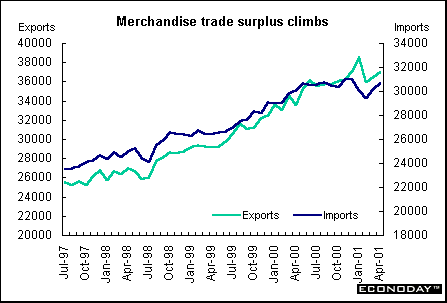
April retail sales jumped 1.6 percent and 6.8 percent when compared with last year. This was the strongest gain since December 1999, when retail sales rose 1.8 percent. Excluding sales by motor and recreational vehicle dealers, retail sales advanced 0.6 percent and 6.4 percent when compared with last year. April's growth in retail sales was concentrated in the automotive and clothing sectors.
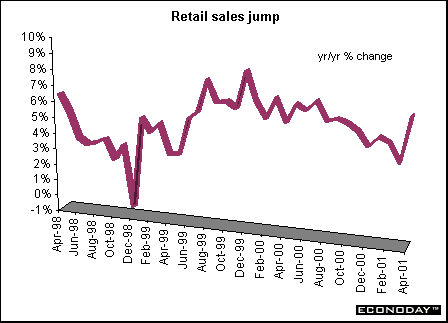


Introduction • Global Stock Market Indexes • Recap of Global Markets • Currencies • Indicator Scoreboard

The Bottom Line • Looking Ahead
|